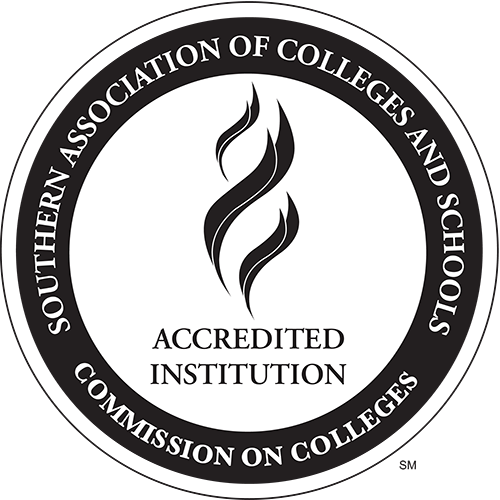
The University of South Alabama is accredited by the Southern Association of Colleges and Schools Commission on Colleges (SACSCOC) to award baccalaureate, masters, educational specialist, and doctorate degrees. The University of South Alabama also may offer credentials such as certificates and diplomas at approved degree levels. Questions about the accreditation of the University of South Alabama may be directed in writing to the Southern Association of Colleges and Schools Commission on Colleges at 1866 Southern Lane, Decatur, GA 30033-4097, by calling (404) 679-4500, or by using information available on SACSCOC’s website.
* indicates US Dept. of Education approved accreditor
Helpful information for coordinators of accredited program (PDF)
The University of South Alabama completed its most recent affirmation in 2023.
What is SACSCOC?
The Southern Association of Colleges and Schools Commission on Colleges (SACSCOC) is the regional body for the accreditation of degree-granting higher education institutions in the Southern states. This includes Alabama, Florida, Georgia, Kentucky, Louisiana, Mississippi, North Carolina, South Carolina, Tennessee, Texas, Virginia and Latin America.
Why is SACSCOC accreditation important?
Accreditors provide oversight of institutions on behalf of the federal government. In order to be eligible to accept federal financial aid, federal grants, and most other extramural funding, institutions of higher education must be accredited by a USDOE approved accrediting body.
What is reaffirmation of accreditation?
Reaffirmation of accreditation is required every 10 years and involves off-site and on-site reviews based on a set of core requirements, comprehensive standards and federal requirements as laid out in SACSCOC's Principles of Accreditation. The review also requires the development of a Quality Enhancement Plan (QEP) targeted at improving student learning and supporting the mission of the University.
The reaffirmation of accreditation is the culmination of more than two years of work by faculty, staff and administrators.
In between these decennial reviews, the University prepares a Fifth-Year Interim Report (FYIR) to demonstrate compliance with the Principles of Accreditation and the efficacy of the Quality Enhancement Plan. USA will submit an FYIR in 2029.
Reaffirmation Components
Compliance Certification
In order to be accredited by SACSCOC, the University is required to conduct a comprehensive compliance audit prior to the filing of the Compliance Certification. The comprehensive compliance audit includes an assessment of all programs and courses offered by the institution on-campus and off-campus, and those offered through distance learning. The Compliance Certification, signed by the institution’s chief executive officer and accreditation liaison, attests to the institution’s honest assessment of compliance with the accreditation requirements of the Commission on Colleges (including all Standards in the Principles of Accreditation) as applied to all aspects of the institution.
Quality Enhancement Plan
"The Quality Enhancement Plan is an integral component of the reaffirmation of accreditation process and is derived from an institution’s ongoing comprehensive planning and evaluation processes. It reflects and affirms a commitment to enhance overall institutional quality and effectiveness by focusing on an issue that the institution considers important to improving student learning outcomes and/or student success. The document submitted by the institution demonstrates that its QEP (a) has a topic identified through its ongoing, comprehensive planning and evaluation processes; (b) has broad-based support of institutional constituencies; (c) focuses on improving specific student learning outcomes and/or student success; (d) commits resources to initiate, implement and complete the QEP; and (e) includes a plan to assess achievement.” (from SACSCOC QEP)
Timeline
Leadership Team
Who can answer my questions about SACSCOC?
For general questions or comments, please contact the Institutional Effectiveness Office at 251-460-6447 or effectiveness@southalabama.edu.
Project Overview
The University of South Alabama developed the LevelUP Quality Enhancement Plan (QEP) to equip students to explain how their experiences at the University of South Alabama prepared them for what comes next-- further studies or their careers. The LevelUP QEP provides a means of explicitly highlighting the value of learning experiences gained by University of South Alabama students and enhancing opportunities for students to develop competencies and skills that prepare them for life after their degree, as confident, ready, and capable members of the workforce or well-equipped graduate students.
To learn more, please visit the Quality Enhancement Plan website or contact Dr. Julie Estis, Executive Director of Academic Enhancement.
The Southern Association of Colleges and Schools Commission on Colleges (SACSCOC) requires all accredited institutions to have a written substantive change policy and procedure that is approved through institutional processes. The approved policy will be accessible to those within the university and to those in the general public.
According to the SACSCOC Substantive Change Policy, “Substantive Change is defined by SACSCOC as a significant modification or expansion of the nature and scope of an accredited institution. Substantive change includes high-impact, high-risk changes, and changes that can impact the quality of educational programs and services.”
The SACSCOC Liaison is responsible for monitoring and reporting compliance with the SACSCOC Substantive Change Policy. The Liaison is also tasked with providing education and training about substantive change across the University so that key personnel recognize when to consult the University’s substantive change policy and when to contact the SACSCOC Liaison about a potential substantive change. When the SACSCOC Liaison is unable to determine definitively whether a change falls within the scope of the SACSCOC Substantive Change Policy, the SACSCOC Liaison or the University President will confer with the University’s assigned SACSCOC staff member.
Just as the entire University is responsible for helping the University maintain its accreditation, the entire University is also responsible for communicating with the SACSCOC Liaison about potential substantive changes as they arise.
The University's Substantive Change Procedure is available on the Academic Affairs website.



